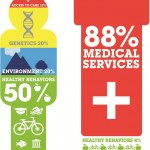obesity
On average, eating healthy costs about $1.50 more per day than the least healthy diets, a new study finds. The extra cost seems insignificant at first — a small cup of coffee often costs more — but it all adds up to be a considerable barrier for many low-income families.
Researchers with the Harvard School of Public Health set out to find the evidence behind the conventional wisdom that healthier foods cost more, conducting the most comprehensive meta-analysis to date of price differences between healthy and unhealthy foods. In examining data from 10 high-income nations, researchers found…
In medicine, particularly oncology, it's often the little things that matter. Sometimes, however, the "little things" aren't actually little; they just seem that way. I was reminded of this by a story that was circulating a couple of weeks ago in the national media, often under titles like “Obese cancer patients often shorted on chemo doses”, ”Are obese people with cancer getting chemotherapy doses too small for them?”, and “Obese Cancer Patients Not Getting Full Doses of Chemotherapy Drugs”. It's also interesting to me because it stands in marked contrast to something I've written about a…
After years of hearing about alarming increases in states' obesity rates, it was nice to get some good news: CDC reports that the percentage of low-income preschool children classified as obese has declined in 19 states. (Height and weight data came from 11.6 million children aged 2-4 participating in the Pediatric Nutrition Surveillance System, which monitors the nutritional status of low-income children. Children whose body mass index was at or above the 95th percentile on CDC's growth charts were classified as obese.)
Improvements among obesity rates of school-aged children have been…
by Kim Krisberg
When most of us pass by a new high-rise or drive down a new road, we rarely think: Did the builders and planners consider my health? However, a new report from the U.S. Environmental Protection Agency offers evidence that certain types of land use and transportation decisions can indeed limit the human health and environmental impacts of development.
Released in mid-June, the publication is a revised and updated version of an EPA report initially published in 2001. Agency officials said the report was particularly timely as the nation's built environments are quickly changing…
Caribbean sun anemone. Image from Wikimedia, Omar Spence Photography.
Dr. George Chandy at the University of California, Irvine discovered a toxin in Caribbean sun anemones (see photo) in 1984 and has spent his career studying the toxin. Prior work by his team suggested that a synthetic version of a peptide (ShK-186) from the toxin may help treat autoimmune disease. It works by blocking a specific potassium channel (Kv1.3) important in immune system reactivity. Since potassium channels are also important in the regulation of metabolism and body weight, his team wanted to explore…
I've done it myself. Ask a teenager a healthy place to eat, she'll respond "Subway or Chipotle." What about a less healthy place? Response: "McDonald's or Burger King." But do fast food restaurants that are perceived "healthier" by teens actually translate into fewer calories consumed by them?
Researchers in southern California explored that question in a new paper published in the Journal of Adolescent Health. They teamed up with the community-based group Youth, Family, School and Community Partnership in Action to recruit about 100 adolescents aged 12 to…
Getting more than one helping of food is obviously a draw for patrons of all-you-can-eat restaurants. But can one predict how many trips to the buffet a particular diner will make? Does scoping out the buffet before grabbing a plate lead to more trips? How does sitting in a chair that faces the buffet influence those second or third helpings?
Researchers with Cornell University's Food and Brand Lab have been exploring these questions using 30 trained observers staked out in buffet restaurants in six states. Some of their findings are presented in the current…
by Kim Krisberg
If you serve it, they will eat it. That's one of the many lessons gleaned from a new report on the national Fresh Fruit and Vegetable Program.
In the first really rigorous study of the U.S. Department of Agriculture's (USDA) Fresh Fruit and Vegetable Program (FFVP), researchers found that fruit and veggie consumption was higher among students in FFVP schools. In fact, such students ate about one-third of a cup more of fruits and veggies than students in comparable schools that were not taking part in FFVP. Designed to improve kids' diets, FFVP reimburses elementary schools…
by Kim Krisberg
When it comes to public health law, it seems the least coercive path may also be the one of least resistance.
In a new study published this month in Health Affairs, researchers found that the public does, indeed, support legal interventions aimed at curbing noncommunicable diseases such as diabetes, heart disease and obesity. However, they're more likely to support interventions that create the conditions that help people make the healthy choice on their own. They're less likely to back laws and regulations perceived as infringing on individual liberties. It's a delicate…
Diet seems to be all over the New York Times this week, with an oversell of the benefits of the Mediterranean diet, and now Mark Bittman, everyone's favorite food scold, declaring sugar is the culprit for rising diabetes. His article is based on this interesting new article in PLoS One and begins with this wildly-inaccurate summary:
Sugar is indeed toxic. It may not be the only problem with the Standard American Diet, but it’s fast becoming clear that it’s the major one.
A study published in the Feb. 27 issue of the journal PLoS One links increased consumption of sugar with increased rates…
by Kim Krisberg
When it comes to good health, America is far from top dog.
Yes, we may spend the most, we may have some of the most advanced medical technologies and we may produce some of the best doctors. But when it comes to the ultimate measure of a health care system's success — the health of people and populations — it seems we are losing a winnable battle.
"There's hardly anything more consequential than Americans dying earlier and being sicker," Dr. Steven Woolf, chair of the Institute of Medicine's and National Research Council's Panel on Understanding Cross-National Health…
Image of a cynomolgus macaque. Image credit: iStockphoto/Anna Yu
Researchers at Amgen in British Columbia and California have developed an antibody called mimAb1 that mimics the properties of fibroblast growth factor 21 (FGF21). Having a role in regulating fat and glucose metabolism as well as body weight made this particular growth factor a target for the treatment of obesity and diabetes. When administered to obese cynomolgus monkeys, the new antibody promoted significant weight loss as well as decreases in circulating insulin and glucose concentrations during a…
At the New York Times Well blog, Anahad O'Connor writes about a new study, published in the journal Obesity Surgery, is a caution against recent optimism about gastric bypass surgery's ability to combat Type 2 diabetes. David E. Arterburn and his coauthors conducted a retrospective cohort study of 4,434 adults with Type 2 diabetes who underwent gastric bypass surgery between 1995 and 2008. Within five years after surgery, 68.2% of the subjects experienced "an initial complete diabetes remission" -- but then 35.1% of those "remitters" redeveloped diabetes within another five years.
The study…
It's no secret that the U.S. has a weight problem. Nearly 36% of U.S. adults are obese and another 33% are overweight, with respective body mass indices of 30 or higher and 25 to 29.9. Strategies to address this public health problem rely heavily on individuals' changing their behavior, such as increasing physical activity and reducing calorie intake. These interventions are easier said than done, and may not be making a dent in the U.S. obesity epidemic. A result analysis suggests that by 2030, 51% of the U.S. population will be obese.
A new report…
Via Ezra Klein, here's a striking infographic from the Bipartisan Policy Center comparing what makes us healthy to how we as a nation spend our health dollars:
Infographic from the Bipartisan Policy Center
As it illustrates, behaviors are major contributors to our health status, but a tiny fraction of US health spending goes to encouraging healthy behaviors like physical activity.
The Bipartisan Policy Center report Lots to Lose: How America's Health and Obesity Crisis Threatens our Economic Future offers several recommendations for improving nutrition and physical activity in the US. In…
The Institute of Medicine has released a new report, Accelerating Progress in Obesity Prevention: Solving the Weight of the Nation. The committee behind it assessed nearly 800 recommendations that had been previously published, and prioritized those that could have a big impact when undertaken together. They identified five critical areas for change:
environments for physical activity
food and beverage environments
message environments
health care and work environments
school environments
Their goals and corresponding recommendations focus on these environments:
Goal 1: Make physical…
Yes, thirty days of McDonald's meals causes weight gain, even heart palpitations. But what happens to your arteries?
For the first time, a short term, six week, study (using mice) shows that a similar diet causes arteries to begin clogging, and worse, affects its structural and mechanical properties. This study used a high fat diet comprised of about 36% of calories as fat; a Big Mac has about 49%.
From the study:
The arterial compliance was compared between control and high fat-fed mice for 6 weeks.We show that the compliance of the TDAs was dramatically reduced in high fat-fed mice…
A few weeks ago Tara Parker Pope wrote The Fat Trap for the NYT and once I read it I started sending it to other doctors I know. It is a great summary on the current knowledge of why we get fat, and more importantly for those of us that already are tipping the scales, why is it so damn hard to take that weight back off. (I'll discuss Young, Obese and Getting Weight Loss Surgery nearer the end)
Beginning in 2009, he and his team recruited 50 obese men and women. The men weighed an average of 233 pounds; the women weighed about 200 pounds. Although some people dropped out of the study, most…
In an interesting intersection of my interests in food and foster parenting, there's an emergent tendency to view extreme childhood obesity as a problem of medical neglect. Medical neglect can be grounds for removing children from their home and placing them in foster care, as seen in this recent case in Ohio:
An Ohio third-grader who weighs more than 200 pounds has been taken from his family and placed into foster care after county social workers said his mother wasn't doing enough to control his weight.
The Plain Dealer reports that the Cleveland 8-year-old is considered severely obese and…
In a new New York Times Magazine piece, John Tierney pulls together the results of several studies that suggest willpower is finite and decisionmaking exhausting. While these findings are important in many ways (Tierney leads off with an example from the criminal justice system), I was especially interested in the implications for dieting.
The whole article is well worth a read, but in a nutshell, researchers have found that subjects' willpower can be depleted by resisting temptation and be restored by glucose -- but not by artificial sweetners that provide less energy. When subjects'…



